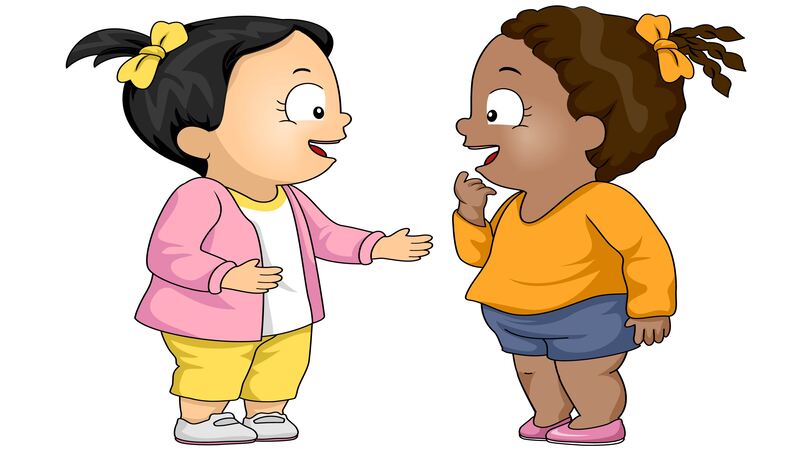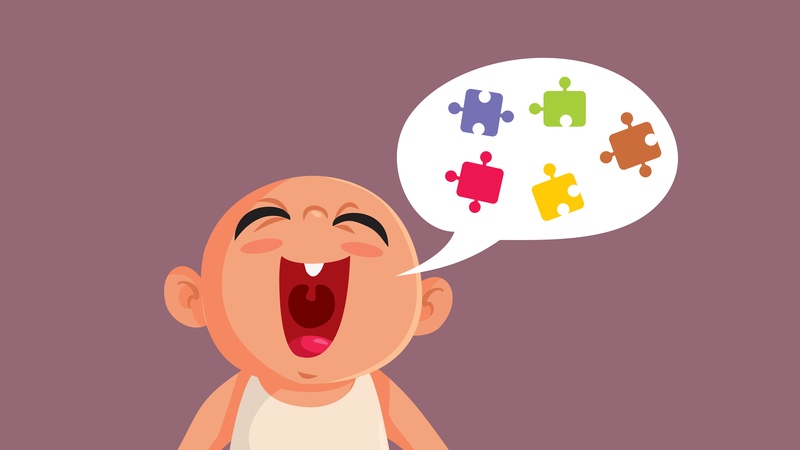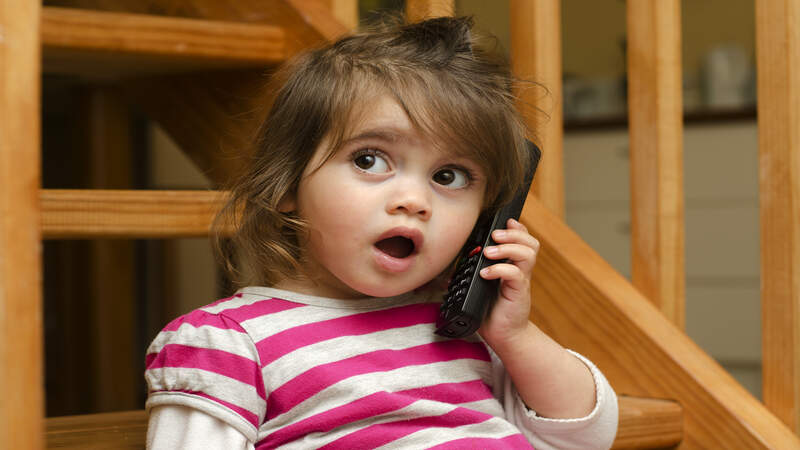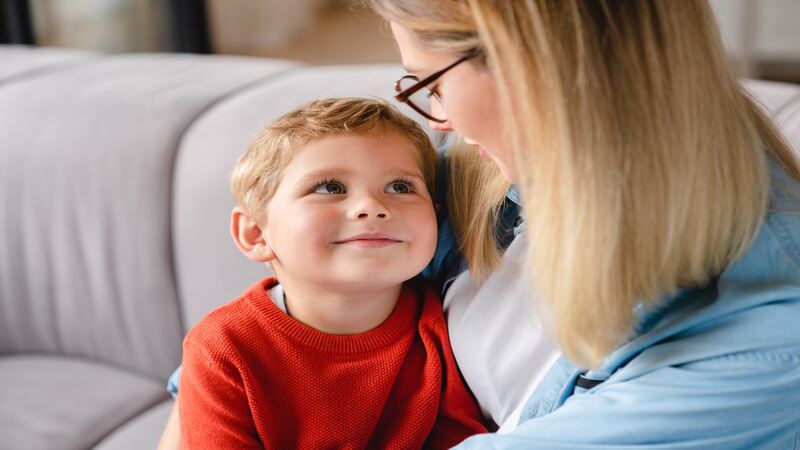 Your toddler’s journey to speaking fluently is not as simple as a walk in the park. The Baby’s Journey of language development begins slowly, but steadily. They say the words first, which will be music to your ears. Then they say short phrases. Then they say a combination of words, phrases, and pointing actions to convey what they want.
Your toddler’s journey to speaking fluently is not as simple as a walk in the park. The Baby’s Journey of language development begins slowly, but steadily. They say the words first, which will be music to your ears. Then they say short phrases. Then they say a combination of words, phrases, and pointing actions to convey what they want.
Then, only then, will they start stringing together all words and phrases together to make simple sentences. Since speaking in sentences is what will finally give way to them speaking fluently, it definitely is an important milestone. Let’s understand the different phrases of toddler speaking according to their age to better facilitate their language development.
Speech Milestones at 12 Months

By the time your toddlers hit their first birthday, they can successfully utter their first few words too. This can be the name of the closest people to their little hearts; “mamma” or “pappa” (1). However, do not panic if they are taking time to utter their first meaningful words. Give your newly-crowned toddler some more time.
They will soon be able to hit their age-specific language developmental milestones including;
- Imitating the sounds that you utter
- Saying mono-syllabic and di-syllabic words like “mama”, “papa”, “dada”,” no”,”oh-ho”, etc.
- Understanding the meaning of no along with shaking their head for it
- Waving hands when you say “bye-bye”
- Responding to their names
- Responding to simple instructions like “come here” or “don’t go”, etc.
Speech Milestones at 18 Months

By the time your toddler hits 18 months, they will be able to utter at least three or more words (2). You can notice they are gradually adding new words to their little vocabulary.
The important language developmental milestones of 18 months are :
- Saying more than 3 single words
- Following simple directions without any gestures, like giving you a toy when you say, “Give this to me.”
- Saying “yes” or “no” in meaningful situations
- Points out the thing they want
- Making the sounds of their favorite animals or pets like “mew mew” or “roar roar.”
- Recognizing the names of their familiar people and some body parts
Speech Milestones at 2 Years

By the time your toddler reaches their second birthday, you will see a blast in their language production. The productive vocabulary of a 2-year-old is around 300 words (3). This means now your toddler can comprehend and respond to that many words, though they might not say that many words.
The linguistic developments you can expect by this time include :
- Saying around 50 words
- More efficiently following your instructions
- Adding new words to their vocabulary regularly
- Repeating the words they are hearing
- Starting to sing some rhymes and jingles
- Saying two to four-word sentences
Speech Milestones at 3 Years

By the time your toddler gets 3, they are pro-orators able to utter everything they are hearing around. You will have to be extra cautious about minding your words around them.
The linguistic developments you will witness in your toddler around 3 years include (4) :
- Using around 200 to 300 words
- Know at least a word for anything they want to express
- Effectively hold a conversation with you by expressing their feelings verbally
- Can utter their names, parent’s and friend’s names
- Start asking simple Wh-questions like “What is this?” or “Where is Mamma?”
- Understand the meaning of simple prepositions like “in”, “on”, “under”, etc
- Follow your detailed instructions that may involve 2 or more steps, like “pick up the ball and throw it.”
However, while opting for the toddler speaking milestones, note that every kid is unique. Your toddler might start saying 2-word sentences before or after they turn 1.5 years old. Some kids are just late talkers (read more about it here. There is nothing to worry about if your kid is 1.5 and has not uttered a sentence yet. All you need to do is relax and talk to them. The more you talk and interact, the faster will they pick up words and eventually sentences.
How To Encourage Your Child To Speak In Sentences?

Whether your toddler is on track with speaking milestones or not, there are many ways you can encourage them to speak in sentences. Following are a few tips that might help you:
- No interruptions, please: When your toddler is struggling to construct a sentence, it might be very tempting for you to finish the sentence for them. Do not do this. Your constant interruptions might irritate the kid and hamper their process of independent language learning. As a result, they might give up on forming sentences on their own.
- Interact a lot: The idea is to give your kid plenty of opportunities to talk and interact with you and others. As they hear you talk more, they learn how you form sentences in different situations and try to copy them themselves (5).
- Bye-bye to baby talk: We know how you do not want to stop hearing the baby talk yet. But if you want your child to progress in speech development, then you need to stop the baby talking and speak to them using real words. Read more on baby talking here.
- Add words to your baby’s talk: If they are saying “want milk”, then you can say “Oh! You want some milk to drink? I will give you some milk to drink”. When this is repeated many times, the toddler will learn that “drink” is a word used along with milk. Similarly, whenever you expand his words, he learns new adjectives, conjunctions, and different tenses.
- Question him: One way to get them to develop their language skills is to ask them a lot of questions. When you ask them something and wait for the reply, they feel encouraged to answer your question properly (6). Make sure you do ask open-ended questions (and not something where they can give a yes, no, or any other mono-syllable answer).
- Give attention: Unless you pay attention, your kid will not feel encouraged to converse with you. If you are not paying attention or are preoccupied with other things, your child will get distracted too. Even if you cannot spend too much time with your toddler, make the time you spend—even though little—worth it
- Use alternative words: When you are trying to expand your toddler’s vocabulary, keep on using alternative words and thus vary your speech. Slowly, they will learn to say and differentiate between different words and instinctively start to use them themselves.
- A toy telephone: Giving a toy telephone to a kid is a wonderful way to encourage language development. Pretend play, which is fairly common in toddlers, can be put to use here (7). Your child can make calls to his grandma or dad, who is at work, and talk!
When to Worry About Your Toddler’s Language Development?

It is completely fine if your toddler is showing late development in language learning. Unless and until they are showing improvements, it is completely fine.
But you need to worry about your toddler’s language development or may even take the advice of their pediatricians if they do not –
- Utter at least 4 to 6 words, or learn at least a new word a month for 18 months
- Follow your simple directions or utter two-word sentences by the age of 2 years
- Able to speak meaningful 3-word sentences by the age of 3 years.
These signs of linguistics imparity can indicate greater conditions of developmental delay. Timely intervention of a speech therapist can effectively resolve the problem.
Slowly, but gradually your efforts for toddler speaking will result in your kid’s meaningful use of words and expressions for all their needs. So, utilize all your ways to speak with your toddler to facilitate their age-appropriate language development.
FAQ’s
1. When Should Toddlers Speak In Sentences?
By the age of 3 years, toddlers can make up meaningful sentences. Before that, they will utter 2 to 3-word sentences. But by 3 years, they can make up complete sentences in their perfect subject-verb order.
2. How Do I Get My Toddler To Talk In Sentences?
The best way to teach your toddler to talk is to talk to them always. The more you talk to them and talk around them, the more they will observe and utilize words to make up their own sentences.
3. Can a 2.5-Year-Old Speak in Sentences?
Yes, a 2.5-year-old toddler can speak in 2 to 3-word sentences to express their feelings sufficiently. During this age, you will see rapid vocabulary expansion in your toddler. So, don’t be surprised if your toddler comes up with new words daily.
4. Is it OK If My 2-Year-Old Doesn’t Talk?
If your 2-year-old doesn’t show any sign of speech, then surely it is a problem. Coming up with no words at 2 years indicates a significant developmental and learning delay that needs time intervention to cure.
5. At What Age Do Kids Talk Clearly?
At around 2.5 to 3 years old, your toddler can utter clear, comprehensible words and mini sentences. By the age of 4, they will be able to make fully comprehended sentences that anyone can clearly understand.
References
- Adlof, S. (2019). Prologue to the forum: Vocabulary across the school grades. Language, Speech and Hearing Services in Schools, 50, 461-465, Levine, D., Strother-Garcia, K., Golinkoff, R.M., & Hirsh-Pasek, K. (2016). Language development in the first year of life: What deaf children might be missing before cochlear implantation. Otology & Neurotology, 37(2), e56-e62. – https://raisingchildren.net.au/babies/development/language-development/language-3-12-months
- CDC, Important Milestones: Your Child By Eighteen Months – https://www.cdc.gov/ncbddd/actearly/milestones/milestones-18mo.html
- Eshghi M, Adatorwovor R, Preisser JS, Crais ER, Zajac DJ. Vocabulary Growth From 18 to 24 Months of Age in Children With and Without Repaired Cleft Palate. J Speech Lang Hear Res. 2019 Sep 20;62(9):3413-3430 – https://www.ncbi.nlm.nih.gov/pmc/articles/PMC6808344/
- National Center on Birth Defects and Developmental Disabilities, Centers for Disease Control and Prevention – https://www.cdc.gov/ncbddd/actearly/milestones/milestones-3yr.html
- Feldman HM. How Young Children Learn Language and Speech. Pediatr Rev. 2019 Aug;40(8):398-411 – https://www.ncbi.nlm.nih.gov/pmc/articles/PMC7236655/
- Wylie BE, Stolzenberg SN, Evans AD. Children’s accuracy in answering Why and How Come questions. Int J Behav Dev. 2021 May;45(3):238-243 – https://www.ncbi.nlm.nih.gov/pmc/articles/PMC9387754/
- Hà, T. A. (2022). Pretend Play and Early Language Development—Relationships and Impacts: A Comprehensive Literature Review. Journal of Education, 202(1), 122-130 – https://journals.sagepub.com/doi/abs/10.1177/0022057420966761?journalCode=jexa
